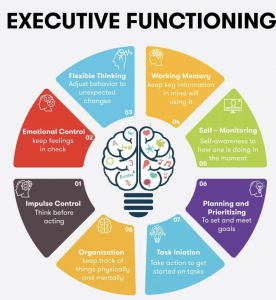Introduction
Assignment 1.3 conveys the importance and role of technical definitions in writing. Students learn to differentiate between the levels of detail in definitions and select the correct approach. They also learn how audience and purpose presuppose the need for definitions.
Complex Term
Executive Function.
Situation
As part of a lecture series offered by UBC, audience members will learn about executive function. As a Neuroscience lecturer, I am tasked with providing a definition and overview of executive functioning, and its relationship to human behaviour.
Parenthetical Definition
Executive function (management system of the brain) allows humans to make analytical and complex decisions.
Sentence Definition
Executive function in humans is a set of mental processes that enables planning, focused attention, memory, and multitasking (Harvard Center on the Developing Child, n.d.).
Expanded Definition
History:
Early psychologists were interested in understanding what drove human decision-making and intelligent behaviours unique to humans. In 1973, while exploring these questions, Karl Pribram coined the term “executive” to describe these behaviours. He proposed that executive function is responsible for: planning, purposeful action (action with meaning), decision making, acquiring knowledge, problem solving, and inhibitory control (controlling impulses) (Diamond, 2014; Goldstein et al., 2013).
Operating Principles:
Executive functioning depends on three types of brain functions: working memory, mental flexibility, and self-control. Working memory allows us to remember and manipulate information over small time scales. Mental flexibility allows us to shift our attention depending on the situation. Finally, self-control allows us to establish our goals/priorities and resist impulses detrimental to our wellbeing (Harvard Center on the Developing Child, n.d.).
Examples:
If you are at a crowded cocktail party having a conversation with someone, executive functioning allows selective attention towards the conversation, enabling you to ignore other voices and noises (Diamond, 2014). Executive functioning also enables inhibitory (impulse) control: if you are trying to eat a healthier diet and see a chocolate bar you know you should not eat, executive functioning allows you to refrain from eating it. Finally, executive functioning is, in part, responsible for your ability to pay attention during a university lecture, learn the content in real time, and translate what your professor says into meaningful notes (Diamond, 2014).
Visual

Figure 1.
Note. Image depicting the various aspects of behaviour executive functioning enables in humans. From Picture Based Checklist to Support Executive Function, by Jenn Judkins, 2021.
References:
Goldstein, S., Naglieri, J.A., Princiotta, D., Otero, T.M. (2014). Introduction: A history of executive functioning as a theoretical and clinical construct. In: Goldstein, S., Naglieri, J. (eds) Handbook of Executive Functioning. Springer, New York, NY. https://doi.org/10.1007/978-1-4614-8106-5_1
Harvard University Center on the Developing Child. (n.d.). Executive Function & Self-Regulation. (n.d.). Center on the Developing Child. https://developingchild.harvard.edu/science/key-concepts/executive-function/
Leave a Reply